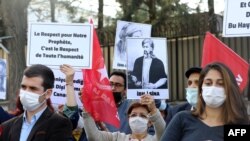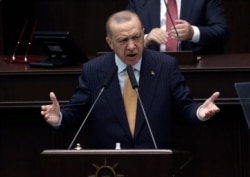Turkish officials have lashed out at the French satirical magazine Charlie Hebdo, which published a cartoon mocking Turkish President Recep Tayyip Erdogan.
The cartoon shows Erdogan, apparently in his underwear, holding a drink and lifting the skirt of a woman wearing Islamic garb.
"We strongly condemn the publication concerning our president of the French magazine, which has no respect to faith, the sacred and values," Erdogan's spokesman, Ibrahim Kalin, tweeted.
Tensions between the two NATO allies have risen in recent months as Macron vowed to defend secularism in the wake of the public beheading of a French teacher earlier this month by a Muslim militant.
The militant was angered because the teacher had shown students the magazine's cartoons depicting the Prophet Muhammad.
Macron called Islam a religion "in crisis" and announced measures to stem what he called separatism. France has the largest Muslim community in Western Europe.
Earlier this week, Erdogan called for Turks and other Muslims to boycott French products.
According to AP, Erdogan said he had not looked at the cartoon, but in parliament he said his "sadness and anger does not stem from the disgusting attack on my person but from the fact that the same [publication] is the source of the impertinent attack [on] my dear prophet."
His vice president was more direct.
"I condemn this incorrigible French rag's immoral publication concerning our president," Fuat Oktay wrote on Twitter. "I call on the moral and conscientious international community to speak out against this disgrace."
Reaction from France
According to Turkish state media, Ankara's Chief Prosecutor's office has launched an investigation into managers at Charlie Hebdo. In Turkey, insulting the president is punishable by up to four years in prison.
A spokesman for the French government said it would not back down against what he characterized as "efforts of destabilization, of intimidation."
"Despite this intimidation, France will never renounce its principles and values, and notably the freedom of expression and freedom of publication" Gabriel Attal said.
"It was hateful comments toward journalists, toward a newsroom, that led to the bloodshed we have seen in recent years in our country," he said, referring to the killing of 12 people in the 2015 attack in Charlie Hebdo's offices in Paris.






